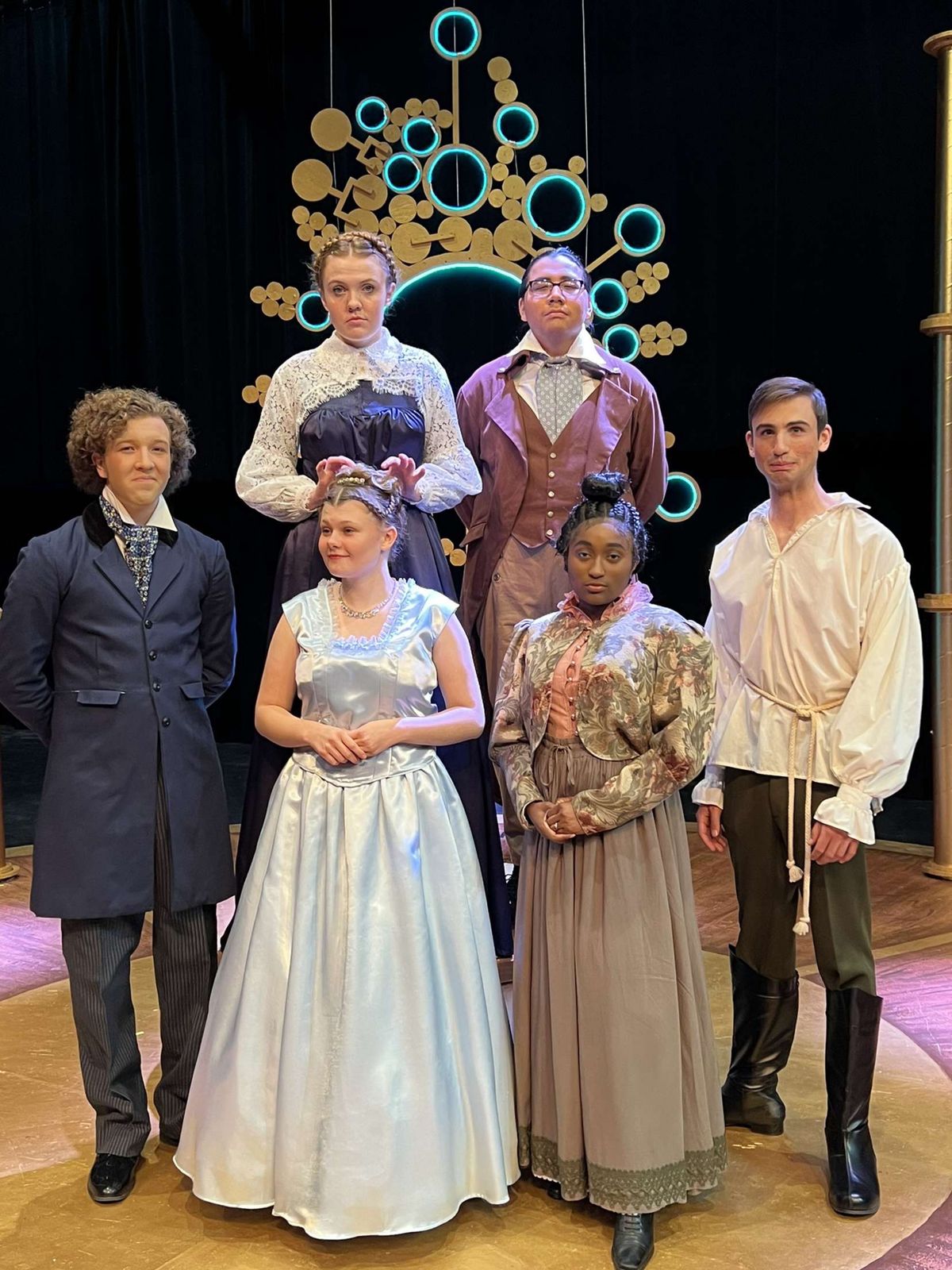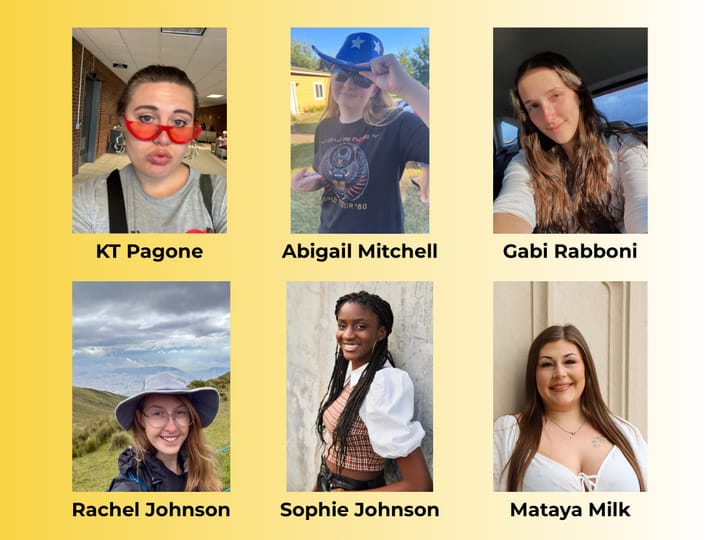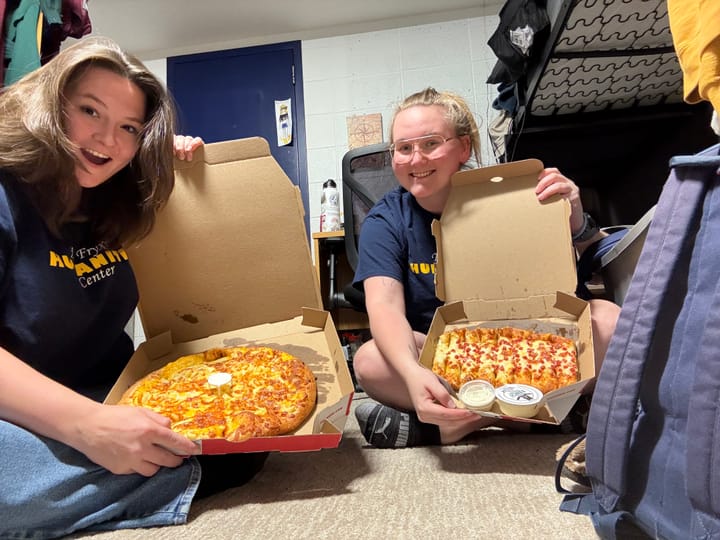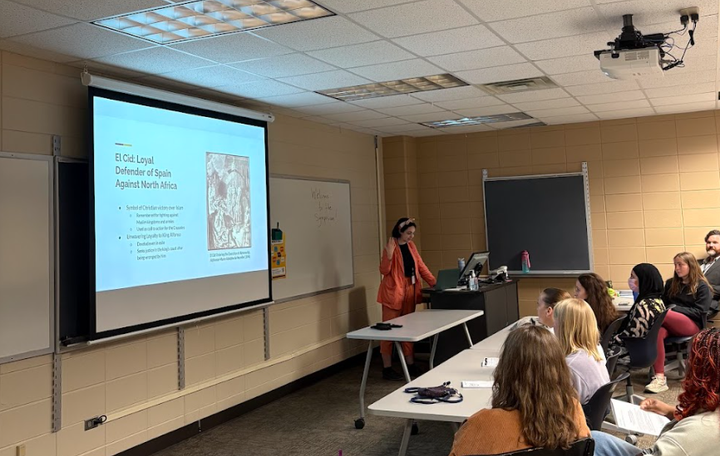“Ada and the Engine” takes the stage

Blue, purple and turquoise light filled the darkness and illuminated golden pillars and twinkling string lights that dangled from the rafters like a waterfall. Actors and audience members alike were showered with lights from the towering set — a mechanism of mathematics, music and light.
The machine set is an analytical engine. The woman standing center stage, Ada Byron Lovelace, played by freshman Izzie Stone, made it with her mind.
“Ada and the Engine,” a play written by Lauren Gunderson, hit the Edith Mortenson Theatre’s mainstage this past weekend.
The play tells the story of Ada Byron Lovelace, a brilliant mathematician who lived in the 1830s.
“There is a conflict of expectations for Ada,” theatre professor Jayna Fitzsimmons, director of “Ada and the Engine,” said. “She’s a woman in society in the 1830s, and she also wants to be her own person and be free from societal constraints to step into a male-dominated field like math.”
In the play, Lovelace lives two lives: one with her husband, Lord Lovelace, played by sophomore Xavier Carbonneau, and one with mathematics. Mathematics includes her love interest and fellow mathematician Charles Babbage, played by freshman Tracen Ashes, and their invention of the analytical engine — the predecessor to the first computer.
There were a few reasons Fitzsimmons wanted to put on this play in particular.
“The script was written by Lauren Gunderson,” Fitzsimmons said. “She is an incredibly skilled playwright. It moves really quickly, and is set in the 1830s but doesn’t feel stuffy or old. It feels current and vibrant. We can see a lot of issues from our own time play out as we look back into the past at Ada’s story.”
Carbonneau said the story of “Ada and the Engine” should be told because of its themes of gender roles and sexism.
Although the play was performed this past weekend, it was meant to be done a lot sooner.
“This play was originally slated for our pandemic season,” Fitzsimmons said. “So it’s really nice to be able to return to [the play] that I’ve wanted to do for so long.”
Both leads in “Ada and the Engine” are freshmen. Carbonneau said Stone and Ashes are “really talented” and that he’s excited that Augustana will have a strong cast in the coming years.
“I love working with new students and mixing things up in casts,” Fitzsimmons said, “It was so wonderful that Izzie and Tracen have done such lovely work. It has been a joy.”
Carter Voorde, senior and understudy for Lord Lovelace, Charles Babbage and Lord Byron, said that working together is easy because the community is “supportive and uplifting,” especially for freshmen classes.
“Communicating isn’t a challenge,” Voorde said. “If there is a problem, it’s easily fixed.”
Fitzsimmons, Carbonneau and Voorde’s favorite scenes were all the same: the last scene that incorporated emotional theatrical design, including colored lighting and music.
“Ada’s dream was always that a computing engine would be able to make music,” Fitzsimmons said. “She saw the connection between science and music and science as an art. That’s where the song at the end springs from. It emerges from the understanding that things that are impossible don’t stay impossible for long.”
Voorde said that putting all the design elements together for the scene made him tear up.
Carbonneau enjoyed the set design and lighting in particular.
“She’s got this glowing dress and lights come down from the ceiling,” Carbonneau said. “The lighting of the set is so pretty too. I guess I just always love seeing stuff come together.”
In the twelve years that Fitzsimmons has directed at Augustana, she said she has learned there is more to theater than just actors on a stage.
“Theater is about imaginative potential,” Fitzsimmons said. “It’s about coming together to collaboratively tell stories. It’s really rewarding because in the theater we don’t do anything alone. And we can form really great connections to stories, to each other and to audiences.”
Voorde gave praise for Fitzsimmons’s direction of the play.
“She’s just so good at having a vision and communicating it with the actors and everyone involved,” Voorde said. “I’m just so impressed how easy she makes it seem. Working with her has been very fun.”
Fitzsimmons hopes that the lessons in Gunderson’s play will stick with the audience after the performance.
“I think it helps awaken the audience’s imagination,” Fitzsimmons said, “I hope that it will make people go, ‘Oh, I want to know more.’”



